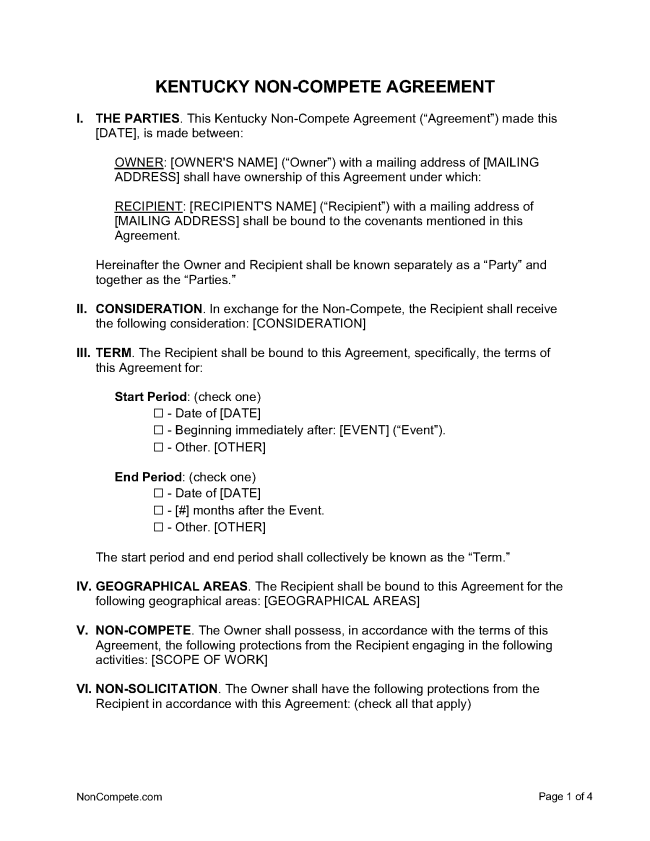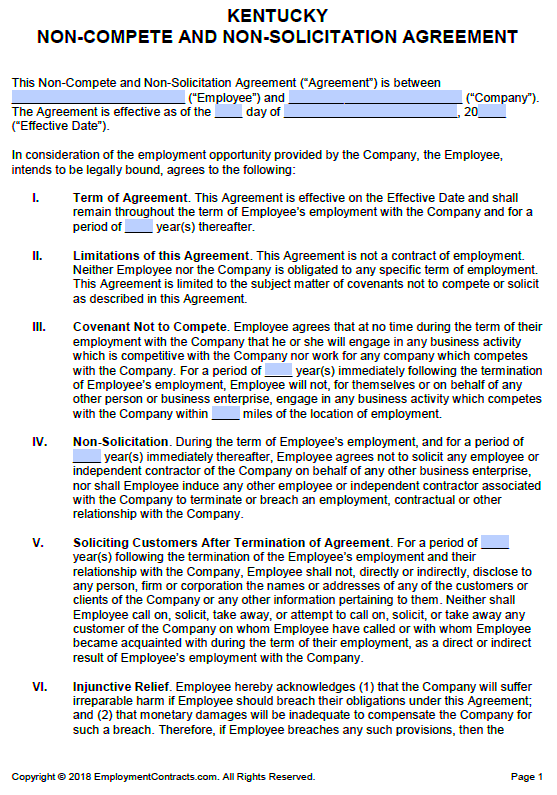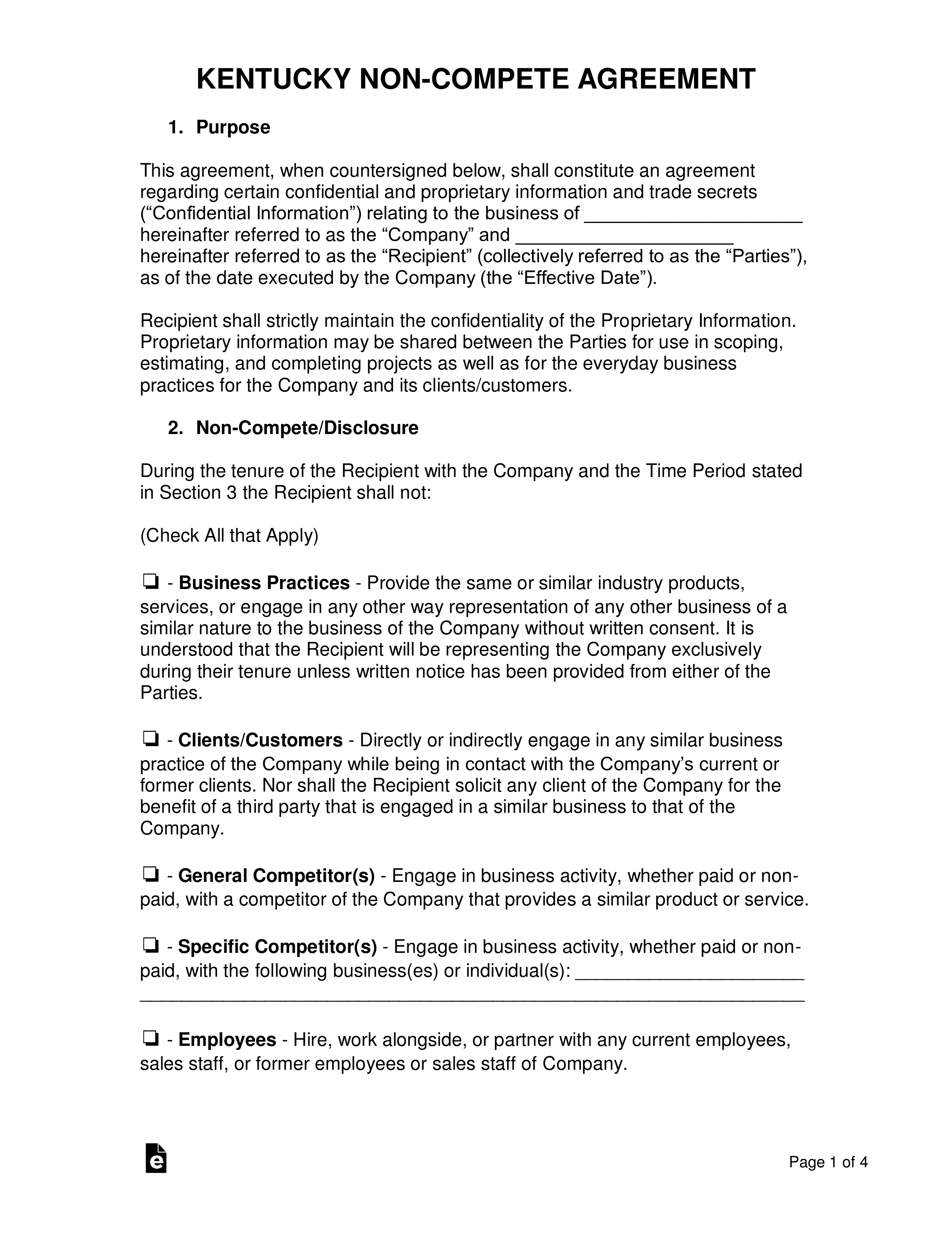Kentucky Non-Compete Laws Overview
When it comes to law non compete agreements frequently surface in discussions about safeguarding business interests. In Kentucky these agreements aim to stop employees from joining competitors or launching their own similar ventures after departing a job. Familiarizing yourself with these regulations can be vital, for both employees and employers in the Bluegrass State. They have the potential to greatly influence career decisions and business activities. Drawing from my experiences I’ve witnessed how these agreements can steer career trajectories and occasionally even spark unforeseen legal disputes. So lets delve into the details of Kentuckys non compete legislation that you should be aware of.
Understanding Non-Compete Agreements

Non compete agreements are legal contracts that prevent employees from competing with their employer once their job ends. They serve to safeguard confidential business data, proprietary information and client connections. But what do these agreements really involve?
Usually a non compete agreement will cover
- Duration: How long the employee must refrain from competing after leaving the company.
- Geographic Scope: The area within which the employee is restricted from competing.
- Scope of Activities: The specific types of activities or business that the employee is prohibited from engaging in.
Based on my interactions with different clients, I’ve noticed that the terms of these contracts can differ significantly. While some are fairly strict, others offer more flexibility. Its crucial to carefully review the details and grasp the implications of what you’re committing to, as it can influence your prospects down the line.
Legal Requirements for Enforceable Non-Compete Agreements

In order for a non compete agreement to hold up in Kentucky it needs to fulfill specific legal criteria. Being aware of these requirements can help you avoid future legal troubles. Here are the key points you should be aware of.
- Reasonableness: The agreement must be reasonable in terms of time, geographic scope, and the scope of activities prohibited. A court may find an agreement unenforceable if it imposes overly broad restrictions.
- Consideration: There must be adequate consideration for the agreement. This means that the employee must receive something of value in exchange for agreeing not to compete. This could be a job offer, a promotion, or a raise.
- Protection of Legitimate Business Interests: The non-compete must be designed to protect legitimate business interests, such as trade secrets or client relationships, not just to prevent competition.
Based on what Ive seen a lot of deals stumble when it comes to these issues. For example if an agreement is overly vague or fails to include consideration it could potentially be deemed invalid in a legal setting. Its always a good idea to seek advice from a professional to make sure your agreement meets these standards.
Factors Influencing Enforceability in Kentucky

In Kentucky the enforceability of a non compete agreement can depend on various factors. Recognizing these factors is essential for both employers and employees. Drawing from my insights here’s a summary of key considerations to keep in mind.
- Reasonableness of Restrictions: Kentucky courts closely examine whether the restrictions in a non-compete agreement are reasonable. This includes the duration of the restriction, the geographic area covered, and the scope of the activities restricted. If any of these aspects are overly broad, the agreement might be deemed unenforceable.
- Legitimate Business Interest: The agreement must be aimed at protecting a legitimate business interest, such as trade secrets or confidential client lists. If it’s primarily about stifling competition rather than protecting business interests, it may not hold up in court.
- Employee’s Role and Knowledge: The role and level of knowledge of the employee can also play a role. For instance, if an employee had access to highly confidential information, a more restrictive agreement might be justified. However, for employees with minimal exposure to sensitive information, the restrictions might be seen as excessive.
- Negotiation and Fairness: Agreements that are one-sided or were not negotiated fairly might face challenges. Courts look at whether the agreement was entered into voluntarily and if the terms were fair and transparent.
I remember a situation where a non compete clause was so vague that it sparked a drawn out legal feud. The severity of the restrictions was called into question. This serves as a reminder that a carefully designed contract is not solely about safeguarding your interests but also about making sure its equitable and justifiable.
Exceptions to Non-Compete Agreements
Not every non compete agreement is rigid. There are situations where these agreements may not be enforceable in Kentucky. Here are a few exceptions that you should keep in mind.
- Employee Termination Without Cause: If an employee is terminated without cause, the enforceability of a non-compete agreement might be challenged. Courts often view such agreements less favorably if the employee was let go without a valid reason.
- Agreements Imposed on Low-Level Employees: Non-compete agreements imposed on employees who don’t have access to sensitive information or aren’t in key positions might be deemed unreasonable. Courts typically scrutinize the necessity of such agreements for lower-level staff.
- Involuntary Resignation: If an employee resigns due to unlawful or unfair treatment, the non-compete may not be enforceable. Courts may find that such agreements should not penalize employees who leave under duress.
I have come across instances where exceptions were pivotal in reversing non compete clauses. For instance a client who left their job due to a workplace situation received support when the court acknowledged the unjust nature of the limitations imposed on them.
Recent Changes and Developments in Kentucky Law
In recent years Kentuckys non compete laws have undergone some changes mirroring wider trends in employment regulations. Staying informed about these updates is crucial. Take a glance at the latest advancements.
- Legislative Adjustments: Recent legislative changes have sought to make non-compete agreements more balanced. For instance, there has been a push to limit the duration and scope of non-competes, especially for low-wage employees.
- Judicial Trends: Kentucky courts have become more stringent in scrutinizing non-compete agreements. There’s a noticeable trend towards ensuring that such agreements do not unfairly restrict an individual’s ability to earn a living.
- Impact of Federal Regulations: Federal regulations and guidelines are also influencing state laws. For instance, new federal rules aimed at reducing restrictive covenants in employment agreements could impact how Kentucky enforces its laws.
In my view keeping track of these developments is vital for employers and employees alike. For example in a recent situation a law was passed that altered how agreements are enforced. This prompted companies to update their non compete clauses to align with the new rules.
How to Draft a Compliant Non-Compete Agreement
Creating a non compete agreement that holds up in Kentuckys courts demands meticulous attention to detail. Based on my insights here are some tips to help you craft a non compete agreement that is both effective and compliant.
- Define the Scope Clearly: Be precise about what activities are restricted. Avoid vague terms. Instead of saying “any similar business,” specify the type of business or industry. Clear definitions help in enforcing the agreement and reduce the risk of it being struck down as too broad.
- Set Reasonable Time Limits: Kentucky courts look for reasonableness in duration. Typically, a non-compete should last no longer than 1-2 years. Anything longer might be deemed excessive unless you have a compelling reason for a longer period.
- Limit Geographic Reach: The geographic scope should align with where your business operates. For instance, if your business is local to Kentucky, a nationwide restriction would likely be overkill and could be contested.
- Ensure Adequate Consideration: The agreement must be backed by consideration—something of value exchanged for the employee’s agreement. This could be a job offer, a raise, or other benefits. Without this, the agreement might be considered unenforceable.
- Consult a Legal Expert: Having a lawyer review your non-compete agreement is crucial. They can ensure that your document meets all legal requirements and is fair to both parties.
In my view putting effort into creating a carefully crafted non compete agreement is worthwhile. I remember assisting a client who encountered problems due to their agreement being too vague. Lessons from these situations can guide you in steering clear of challenges.
Legal Recourse if a Non-Compete Agreement is Violated
If someone breaks a non compete agreement there are a few legal actions you can pursue. Based on my observations of different cases here’s what you need to know about seeking resolution.
- Enforcement Through Court: If you believe the non-compete has been breached, you can file a lawsuit to enforce the agreement. The court will review the terms of the agreement and decide whether they are enforceable and if a breach occurred.
- Seek Injunctive Relief: In some cases, you may request an injunction to stop the violating party from continuing their actions. This is a temporary court order that can prevent further competition while the case is being resolved.
- Claim for Damages: If the breach has resulted in financial losses, you may be entitled to damages. This includes any lost profits or damages caused by the competitor’s actions. Calculating these damages can be complex, so proper documentation is crucial.
- Mediation or Settlement: Before pursuing court action, consider mediation or settlement negotiations. Often, disputes can be resolved outside of court, which can save time and costs for both parties.
In a situation I dealt with a client was able to uphold their non compete agreement via mediation steering clear of a protracted legal dispute. This serves as a reminder that finding resolutions, through dialogue can often be more advantageous than navigating the complexities of the judicial process.
FAQ
What is a non-compete agreement?
A non-compete agreement is a contract where an employee agrees not to compete with their employer after leaving the job. It typically involves restrictions on working with competitors or starting a similar business for a certain period and within a specific geographic area.
Are non-compete agreements enforceable in Kentucky?
Yes, non-compete agreements are enforceable in Kentucky, but they must meet certain criteria to be valid. They need to be reasonable in scope, duration, and geographic reach, and must protect legitimate business interests.
How long can a non-compete agreement last?
In Kentucky, non-compete agreements are generally enforceable for up to 1-2 years. Anything longer may be deemed unreasonable unless there is a strong justification for a longer duration.
Can I challenge a non-compete agreement?
Yes, you can challenge a non-compete agreement if it is overly restrictive or if it was imposed unfairly. Common grounds for challenging include unreasonableness in scope or duration and lack of proper consideration.
What should I do if my non-compete agreement is violated?
If your non-compete agreement is violated, you can seek legal recourse by filing a lawsuit to enforce the agreement. You may also seek injunctive relief to prevent further violations and claim damages for any losses incurred.
Conclusion
Navigating the landscape of non compete agreements in Kentucky can be tricky. However grasping the key points can make a significant impact. It’s essential to handle these agreements carefully, from creating a compliant contract to being aware of your legal options in case of a breach. I’ve seen how well crafted agreements can safeguard business interests while also ensuring fairness for employees. Make sure your agreements are reasonable, clear and backed by proper consideration. Additionally staying updated on legal changes and seeking guidance can help prevent unnecessary legal conflicts. Ultimately an approach benefits both employers and employees by promoting a transparent work environment.


